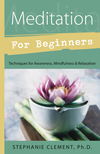Exercise: Working with the Breath

Stress and tension are the direct result of built-up resistance and fear. Stress and tension are the way your body communicates an imbalance in your body. The way to release this tension and balance your system is through the harnessing of the breath. The breath has the power to immediately dissipate all tension and replenish and rejuvenate your life force.
This exercise is done in three parts. The first part guides you to open and relax the breath, the second part allows you to use the breath to release your tension, and the last part uses the breath to refuel your energy and activate your life-force energy.
Lie down in a comfortable place where you will not be disturbed. Place both of your hands onto your stomach. First, notice the rhythm of your breathing. Is it relaxed or is it tense? Does it flow smoothly or does it flow abruptly? Does it fill you with a sense of ease or does it fill you with a sense of agitation?
If your breath is already deep and smooth, then continue breathing in this way, allowing your hands to rise and fall with each new breath. If you find that your breath is shallow and agitated, start calming the breath by breathing deeply into your abdomen. Use your hands to guide the breath going in and out of your abdomen. With each in-breath, allow your hands to rise and with each out-breath allow them to fall. Your hands should be gently guiding your breath, allowing you to breathe very deeply and smoothly.
As your breath becomes more serene and peaceful, start to visualize the ocean. Think of its rhythm and sound. For each inhale and exhale, I would like you to constrict your throat to make a sound that resembles the ocean. This will help you to deepen your breathing. As you lift your abdomen up to inhale, visualize a large wave lifting up inside the ocean. Match the size of this great wave with the full extension of your abdomen. As you exhale, visualize this wave falling and dispersing onto a sandy beach. As you visualize this wave traveling to the very end of the sandy beach, allow your exhale to be fully drawn out to match the long length that this wave would travel. Repeat this visualization until you feel that your body is fully relaxed and your breathing becomes effortless.
Secondly, once your breath is open, start taking notice of the stored-up tension located in different areas of your body. You can start scanning your body as if you were taking x-rays all the way from your head and shoulders down to your legs and feet.
Once you locate where the tension is stored in your body, start using the breath to release this tension. For example, if you find tension in your shoulders (a very common place), then breathe directly into that area of your body and continue breathing there until you feel that your shoulders have become more relaxed. On an inhale you allow your breath to embrace whatever area of your body is tense and needs attention, and on the exhale you use your breath to release this tension. If necessary, you can make a sound while exhaling, which helps some people further eliminate this tension.
Your breath works as a softening agent. Whatever feels hard and rigid, your breath softens. As you release tension in your body, you will release your emotional tension, as well. Since emotional angst, such as anxiety and worry, stores itself in your body, this exercise will greatly affect the way you feel—both emotionally and physically.
Lastly, on an inhale, visualize a golden light coming from just above your head and then traveling down your body and resting itself in your abdomen. Imagine this golden light as a bright and powerful sun of life-force energy. On your exhale, visualize this sun’s vibrant light emanating and flowing from your abdomen into every cell of your body. Imagine every cell of your body receiving this golden healing warmth. Repeat this visualization for five to ten minutes until you feel fully restored.
From Letting the Light In, by Philip M. Berk
Related Products

is subject to certain Terms and Conditions